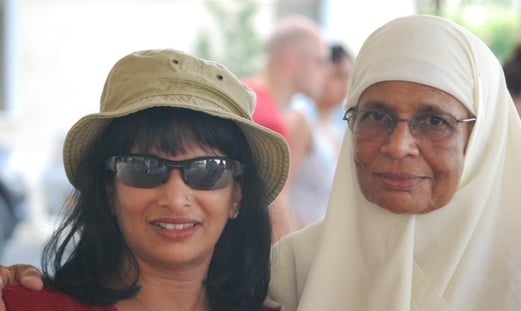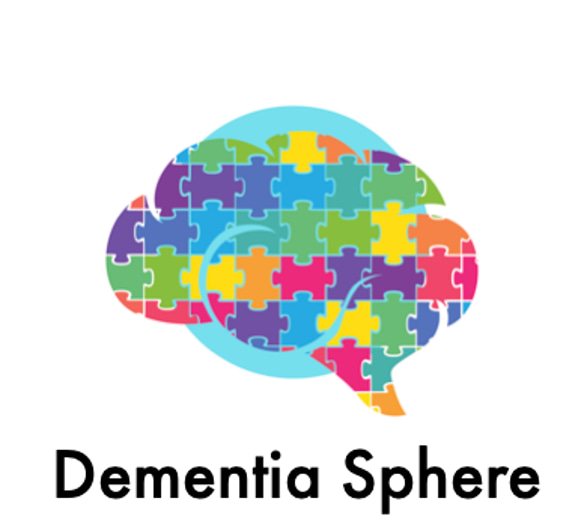About Dementia Sphere
Dementia Sphere started as a personal story focusing on my mother's life with Alzheimer’s Dementia from my perspective as a care giver in the South Asian Community. Initially I was going to focus solely on our journey and what it entailed. I remember the experience being extremely difficult; feelings of loneliness and being alone experienced by both of us. It also occurred to me that given the rising cases of dementia globally and more so in the South Asian Community, I couldn't be the only person feeling the way I was. I often asked the question, where do I go, who do I speak to and who will hear me let alone understand me? It was a very lonely place and I hope that by sharing our story you may resonate with some of the issues and take some comfort in the words. I think the title 'Is there anybody out there?' aptly refers to those times. Moreover, I hope you will want to share your experience with us here on Dementia Sphere.
My mother was diagnosed with the disease in October 2018 and in the Blog section I recount our journey (Mum and Me) from pre-diagnosis to her passing. Through my journey with mum I realised that dementia impacts not only the person with the disease but all those around them, from their family members and carers to friends and the wider community that they belong to, as well as medical and social institutions. Thinking of the hoops I had to jump through and the endless circles I went around, prompted the name ‘Dementia Sphere’.
The aim of Dementia Sphere is not only to tell my story but allow others to contribute to it with their thoughts, knowledge and experience and help build a community and safe place for opinions to be expressed. In some ways, I hope it will serve as a voice for others especially in the South Asian community and create a greater understanding in the wider community.
You have landed on this page because you:
· are interested in learning about the disease,
· have been diagnosed with the disease, or
· are a carer for somebody with the disease,
I hope you can take something from it, share your thoughts and possible issues you’ve faced so that the community can grow and support one another.
About me and my family
Whilst the blog has been focused entirely on mum and me, I realised that to truly represent an accurate picture of both of us, I would need to include some contextual and relevant information about me, my family background and our complex relationships.
I was born in London, (Epping, to be exact) in the early 1960's. We lived in Ongar, Essex until I was 4 years old then moved to South Woodford where our family home was until 2019. We were a small unit of 4; my parents, myself and my younger sister. There are some advantages to being part of a small family but in light of our dementia journey and what I had to face alone, I really wished I had siblings with whom I could have shared the experience.
My mother moved to the UK from Assam, India in 1956, a year after marrying my father. Initially, a housewife, she then worked in the Indian High Commission in London. She was always active until she gave up her job in 1971. I clearly remember her spending many of her afternoons on weekends sewing clothes for either my sister or myself, or knitting. When I was a baby she apparently won competitions run by women's magazines for her knitting several of which I still have tucked away in a box. After she gave up full time work, she went onto teach English part-time, to women in the Bangladeshi community in East London. I remember in my late teens that she enrolled in a course in dress making at the London College of Fashion and did well until she was forced to give up her course because of pressures at home. However, my father was very supportive of her, always encouraging her to fulfil her dreams and aspirations.
My father qualified as a barrister six months after I was born and the plan was to return to India soon after that, but the arrival of my sister four years later changed our lives completely. A year later my parents discovered she had special needs and they thought it better for us to remain in the UK. No formal diagnosis of her condition was ever provided by doctors despite several visits to Great Ormond Street Hospital. They considered her to be ‘slow’ and severely mentally handicapped. Despite demonstrating several autistic behavioural patterns, she was never diagnosed as autistic. Our life at home was governed by my sister’s routines so there really was very little time for anything else.
On the outside we were a happy family and many a time friends would seek comfort in our home; spending time with my parents mulling over issues that they had in their own lives. However, on the inside, a lot was going on. I was not an unhappy child but there were times when I really felt very lonely and sometimes even neglected by my mother through no fault of her own. My sister demanded her time and all of it!! I remember the day when mum and my sister came home from the hospital. I was 4 years old and wanted my mother's attention as she had been in hospital for 3 weeks and when I asked her who would look after me now that my sister was here, her response was that I was 'a big girl now, and I could look after myself.'
When I was eight my parents sent me to boarding school hoping that the structure and discipline would help me and facilitate some form of independence. I was so unhappy at school, crying constantly, that my father would have to collect me every Friday afternoon and drop me back at school on Sunday evening. This became a pattern in my life that carried on even in adulthood; leading my own life during the week and another life on weekends. My parents took me out of boarding school after one year and I returned home to attend the local junior school.
They had already made the decision that my sister’s carer was to be predominantly my mother and my carer was my father. The consequence of this decision was that I bonded very well with my father and spent a lot of time with him when he was available. I have fond memories of playing games with him during the winter in the house and in the summers playing football in the park. I bonded with my mother in other ways. I grew up watching her and learning to cook, bake, sew and knit. To this day, I can say that baking is the one activity that I love to do when I have time. However, all these hobbies did not require other people and it soon became apparent to me that I managed to do things on my own and be independent. If boarding school had taught me anything, it was to be precisely that!
My view on the world has been influenced largely by my parents, our social circle and school, just like any average child. I’ve realised how these influences have shaped the way in which I relate to other people, as well as how I have made professional and personal decisions in my life. In my professional life. I enjoyed working in teams, but my preference was always to work on my own rather than depending on others. I always wanted a job with the possibility of travel and sought to apply for roles that deemed it a requirement. I lacked for nothing financially or physically but at times I would feel like the odd one out in my family, so I realised that I needed to create a family of my own made up of close friends. Shortly after leaving my first job in London, I chose to move away from home to Brighton which was close enough to be able to visit the family every weekend and ten years later, moved to Bradford to pursue my MBA. I wasn’t able to visit my family every weekend but would return home at least once every three to four weekends.
My parents were often baffled by comments from members of the South Asian community that it was sad that they did not have a son. They could never understand the misogynistic attitude that many of them had. They were of the opinion that 'daughters' rather than 'sons' would always look after their parents even after they got married. They brought me up as an equal, discussing family, financial and other important matters with me rather than making decisions for me. My mother was more protective and would encourage me to avoid any scenario where I could get hurt emotionally or physically. My father on the other hand encouraged me to ‘go live and learn’. He was my mentor and I spent many a day seeking his advice and discussing my education and career aspirations with him. Whilst both my parents (like any parent) were keen for me to settle down and get married once I had graduated, they knew that I would only do so once I had experienced more of life and knew that travel was a priority for me. I was fortunate that my father was a great advocate of travel and believed it was one of the best educations one could have. It didn’t bother him that I wanted to go places by myself. Moreover, he encouraged it and took great pride in my adventures.



Privacy Policy
Terms and Conditions